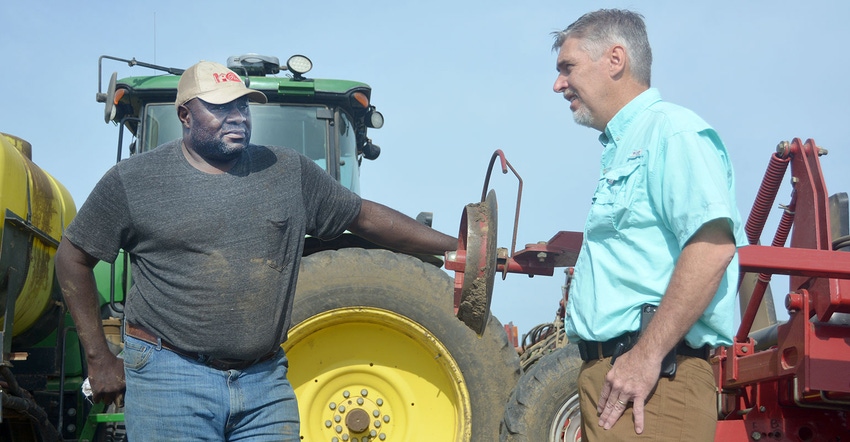May 15, 2019

Mississippi corn producers rushed to finish planting — or replanting — as much as sunny weather has allowed so far in May.
Erick Larson, grains specialist with the Mississippi State University Extension Service, said spring rains complicated conditions, keeping planters out of fields during much of April and contributing to many more establishment issues than normal.
“Corn planted in late March and early April suffered as heavy and persistent rains hit the first weekend in April,” Larson said. “The cool soil temperatures slowed emergence and made the young crop even more vulnerable.”
Larson said corn seedlings are vulnerable to prolonged saturated conditions that limit aerobic activity. A long duration of anaerobic conditions will be harder on plants than the total amount of rainfall.
“When rains persist over a four-day period, aeration problems are likely, particularly on heavy soils, flat-planted fields and deep-planted corn seed,” he said. “These adverse conditions caused seedling mortality or stunted seedling development, leading to growth disparity.”
Larson said research has shown that replanting partial stands or weak spots is counterproductive.
“Corn emergence uniformity is important to high productivity,” he said. “Corn plants that emerge later than others are less productive and lag in growth throughout the season. That creates disproportionate competition between plants for resources, which reduces yield potential.”
Replanting
Similar rules apply to replanting.
“It is absolutely imperative to destroy the remaining live corn plants with either tillage or herbicides before you replant an unacceptable stand,” Larson said.
Lowndes County, Miss., grower Tony Dantzler said he has weighed the decisions about replanting corn carefully. Out of about 1,400 acres, he has replanted all but 120.
“It has helped to have the options researched and available through the Extension Service to help make decisions this year,” Dantzler said. “I’ve never had this much replanting in more than 22 years of farming.”
Dantzler said the good news was that time allowed for the replanting.
“Corn still seems more profitable than soybeans, and that is why we are taking a chance with later plantings,” he said.
Larson said corn may face an uphill battle, but if weather conditions will cooperate, fields still have the potential for favorable yields.
“For many of the corn growers, the recent four-day rain event (preceding Mother’s Day) should not be as detrimental on the late plantings as the rains earlier in the spring,” Larson said. “Warmer temperatures helped the seed germinate and emerge quicker. In general, recent plantings have successfully emerged, unless exposed to prolonged flooding.”
While 92 percent of the corn is planted, the majority — 66 percent — is in fair, poor or very poor condition, according to the Mississippi Crop Progress and Condition report released May 13.
About the Author(s)
You May Also Like






